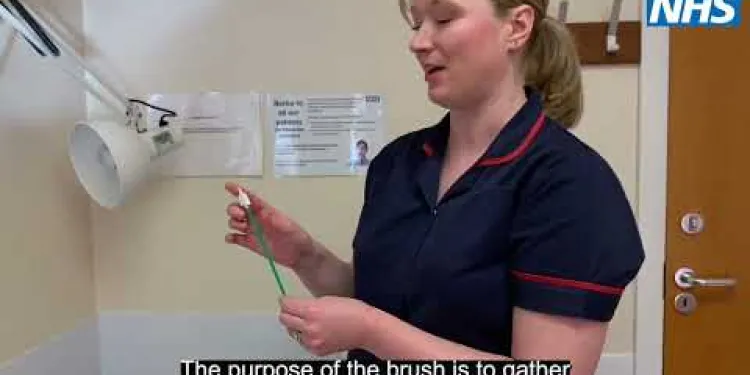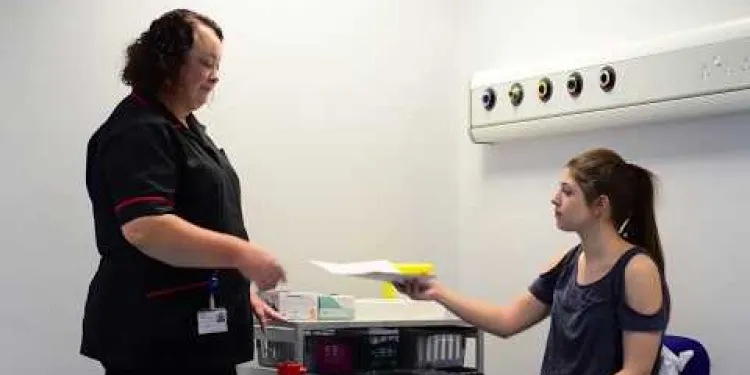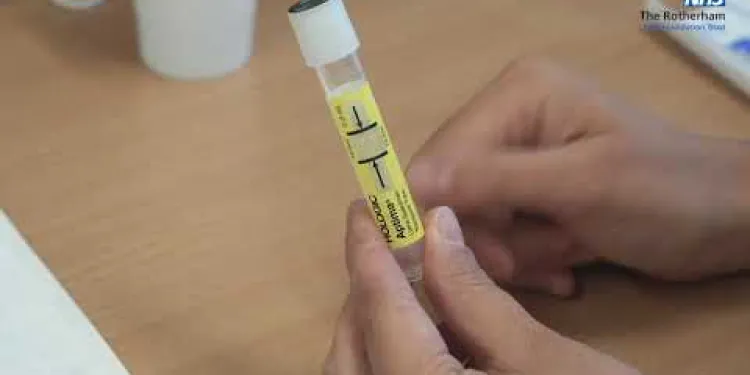
Find Help
More Items From Ergsy search
-

Is HPV testing available?
Relevance: 100%
-

HPV - My Story | NHS
Relevance: 74%
-

Can HPV be treated?
Relevance: 72%
-

What is the HPV Virus?
Relevance: 72%
-

Are there symptoms of an HPV infection?
Relevance: 70%
-

Can HPV lead to cancer?
Relevance: 70%
-

How common is HPV?
Relevance: 69%
-

How can HPV be prevented?
Relevance: 69%
-

How is HPV transmitted?
Relevance: 68%
-

Can HPV affect both men and women?
Relevance: 66%
-

What is the link between HPV and cervical cancer?
Relevance: 66%
-

Can HPV go away on its own?
Relevance: 66%
-

What is the year 8 HPV vaccine? | NHS
Relevance: 65%
-

Do men need the HPV vaccine?
Relevance: 64%
-

Who should get the HPV vaccine?
Relevance: 63%
-

Can using condoms fully protect against HPV?
Relevance: 61%
-

What health problems can HPV cause?
Relevance: 60%
-

What age group is most at risk for HPV?
Relevance: 58%
-

Surge in HPV Vaccination Rates Among Young Women in the UK
Relevance: 56%
-

Cervical screening (smear test) – what’s it all about?
Relevance: 52%
-

Is there a vaccine for HPV?
Relevance: 51%
-

What is cervical screening (smear test)?
Relevance: 50%
-

How many types of HPV are there?
Relevance: 45%
-

Can the test be performed during my menstrual period?
Relevance: 38%
-

Is there an autism test?
Relevance: 36%
-

Booked in for your smear test (cervical screening) and not sure what to expect?
Relevance: 35%
-

NHSGGC - Cervical Cancer Screening - English
Relevance: 35%
-

What is a pregnancy test?
Relevance: 35%
-

Are digital pregnancy tests more accurate than non-digital tests?
Relevance: 35%
-

Getting tested for Chlamydia
Relevance: 35%
-

What is PSA testing?
Relevance: 35%
-

Having a blood test
Relevance: 35%
-

Don’t ignore your cervical screening invite | NHS
Relevance: 34%
-

Understanding Your Sexual Health - Genital Warts
Relevance: 33%
-

Can a pregnancy test expire?
Relevance: 33%
-

Sexual Health - HIV Testing
Relevance: 33%
-

Urine test for Gonorrhoea and Chlamydia
Relevance: 33%
-

Urine test for Gonorrhoea and Chlamydia
Relevance: 33%
-

Is there a test for West Nile Virus?
Relevance: 33%
-

What is the DVSA Theory Test?
Relevance: 33%
Is HPV Testing Available in the UK?
Human Papillomavirus (HPV) testing is indeed available in the United Kingdom and plays a crucial role in preventing cervical cancer. HPV is a common virus that can lead to cervical cancer in women if not detected and managed early. Recognizing its significance, the UK health authorities have integrated HPV testing into cervical screening programs to enhance early detection and intervention.
What is HPV Testing?
HPV testing checks for the presence of the virus in cervical cells. It is primarily used to identify women at risk of developing cervical cancer. The test specifically looks for high-risk strains of HPV that are most likely to cause cell changes in the cervix, leading to cancer if left untreated. This makes HPV testing a vital tool in preventive healthcare.
How does HPV Testing Work?
The testing process involves a healthcare provider collecting a sample of cells from the cervix. This sample is then tested in a laboratory to detect any high-risk types of HPV. If a high-risk HPV strain is found, further testing or monitoring may be recommended, depending on the individual's age and health history.
HPV Testing in the NHS Cervical Screening Programme
In the UK, the NHS provides a systematic cervical screening programme that incorporates HPV testing. Women aged between 25 and 64 are invited for regular screenings, often referred to as smear tests. This screening programme aims to detect early changes in cervical cells primarily caused by HPV. From 2019 onwards, the programme has used a method called ‘HPV primary screening’, where the initial test checks for high-risk HPV first. If HPV is detected, the same sample is checked for any cervical cell abnormalities.
Benefits of HPV Testing
Integrating HPV testing into cervical screening allows for earlier identification of women at risk, leading to timely follow-up and management. Early detection is crucial as it significantly reduces the likelihood of developing advanced cervical cancer. Moreover, negative HPV results provide reassurance and may suggest less frequent screenings, depending on age and other risk factors.
Availability and Access
HPV testing is widely available across the UK through the NHS. Women eligible for cervical screening receive invitations by mail, detailing when and how to book their appointment. The test is free of charge and accessible at most GP practices, making it convenient for women across various regions.
Conclusion
HPV testing is a vital part of cervical cancer prevention in the UK. Its availability through the NHS cervical screening program ensures that women have access to this critical test, enhancing the early detection and management of potential cervical health issues. By participating in regular screenings, women can significantly reduce their risk of cervical cancer and contribute to better overall health outcomes.
Is HPV Testing Available in the UK?
Yes, HPV testing is available in the UK. HPV stands for Human Papillomavirus. This test helps prevent cervical cancer. HPV is a virus that can cause cervical cancer in women. The UK uses this test in health programs to catch the virus early and help stop cancer.
What is HPV Testing?
HPV testing looks for the virus in cervical cells. This test is for finding women who might get cervical cancer. It checks for types of HPV that can cause changes in the cervix. These changes can lead to cancer if not treated. The test helps keep women healthy by finding the virus early.
How Does HPV Testing Work?
A doctor or nurse takes a sample of cells from the cervix. A lab checks the sample for risky types of HPV. If the test finds HPV, doctors might do more tests or watch you closely, depending on your age and health.
HPV Testing in the NHS Cervical Screening Programme
The NHS in the UK has a program to check for cervical cancer, and it includes HPV testing. Women aged 25 to 64 get invited for these checks, often called smear tests. The program finds early changes in cervical cells caused by HPV. Since 2019, it first checks for HPV. If HPV is found, it checks for cell changes.
Benefits of HPV Testing
HPV testing helps find women at risk early. This means they get help sooner, which can stop cancer from growing. Finding problems early is very important because it stops worse issues later. If you don’t have HPV, you might not need checks as often.
Availability and Access
You can get HPV testing all over the UK through the NHS. Women who need checks get letters in the mail. The letters say when and how to book an appointment. The test is free and you can do it at most doctor’s offices. This makes it easy for women everywhere.
Conclusion
HPV testing is important to stop cervical cancer in the UK. The NHS offers the test to help women detect health issues early. By going for regular checks, women can lower their risk of cervical cancer and stay healthier.
Frequently Asked Questions
What is HPV testing?
HPV testing is a medical test that checks for the presence of human papillomavirus (HPV) in a sample of cells from the cervix.
Is HPV testing available?
Yes, HPV testing is available in many healthcare facilities, including clinics, hospitals, and labs.
Where can I get an HPV test?
You can get an HPV test at your doctor's office, a health clinic, or a local hospital.
How is an HPV test performed?
An HPV test is usually performed on a sample of cells taken from the cervix during a Pap smear or as a standalone test.
Who should consider getting an HPV test?
HPV testing is typically recommended for women over 30, but it may also be advised for younger individuals with risk factors.
Is HPV testing part of routine cervical cancer screening?
Yes, HPV testing is a part of routine cervical cancer screening for many women, often combined with a Pap test.
How often should I get an HPV test?
HPV tests are usually recommended every 5 years for women aged 30 to 65, but this can vary based on medical guidelines and individual risk factors.
Can men get an HPV test?
There is currently no approved HPV test for men, but men can still carry and transmit the virus.
How much does an HPV test cost?
The cost of an HPV test can vary based on location and healthcare provider, but insurance often covers it as part of routine screening.
Does insurance cover HPV testing?
Most health insurance plans cover HPV testing when it is part of routine cervical cancer screening.
How long does it take to get results from an HPV test?
The results of an HPV test are typically available within a few weeks, but this may vary depending on the lab processing the test.
What does a positive HPV test mean?
A positive HPV test indicates the presence of high-risk HPV types that could potentially lead to cervical cancer.
Can I get an HPV test during pregnancy?
HPV tests can be safely performed during pregnancy if recommended by your healthcare provider.
Is an HPV test painful?
An HPV test is generally not painful, though you may experience some discomfort similar to that of a Pap smear.
What should I do if I test positive for HPV?
If you test positive for HPV, your healthcare provider will discuss the next steps, which may include further monitoring or additional tests.
Is there a way to test for specific types of HPV?
Some HPV tests can identify specific high-risk HPV types, particularly HPV 16 and 18, which are most associated with cervical cancer.
Are there any risks associated with HPV testing?
HPV testing is generally safe, with minimal risks, similar to those associated with a Pap smear.
Can HPV testing be done at home?
Some home kits are available for HPV testing, but you should consult your healthcare provider for advice and confirm the reliability of the kit.
How do I prepare for an HPV test?
To prepare for an HPV test, you may be advised to avoid intercourse, douching, or using vaginal medicines for 48 hours before the test.
Do all HPV infections require treatment?
Not all HPV infections require treatment, as many clear on their own. However, certain high-risk HPV types may require further monitoring or treatment.
What is HPV testing?
HPV stands for Human Papillomavirus. It is a virus that can make people sick.
An HPV test checks if you have this virus.
Doctors use a sample from your body, like a swab, to do the test.
If you want help to read this, ask a friend or family member to go through it with you. Pointing to the words as you read can help, too.
HPV testing is a medical test. It checks if there is a virus called human papillomavirus (HPV) in some cells from the cervix.
Can you get an HPV test?
Yes, you can get an HPV test at many places like clinics, hospitals, and labs.
Where can I get tested for HPV?
You can get an HPV test at:
- Your doctor's office
- A health clinic
- A hospital
Ask a nurse or doctor for help. They will tell you where to go.
Use a phone or computer to find places near you. Try typing "HPV test near me" in a search engine.
You can get an HPV test at your doctor's office, a health clinic, or a local hospital.
---You can have an HPV test at the doctor's office. You can also go to a health clinic or a local hospital.
How do doctors check for HPV?
To check for HPV, doctors look inside a woman's body. They use a special tool to gently open the area. Then they take a small sample to test for the HPV virus.
If you want help, bring a trusted person with you. You can also ask the doctor questions if you feel worried.
Doctors do an HPV test by looking at cells from the cervix. They get these cells during a Pap smear or by doing the HPV test by itself.
Who should think about getting an HPV test?
Some people might need an HPV test.
- If you are a woman over 30, you might need it.
- If your doctor says you need one, you should get it.
If you do not understand, ask your doctor. They can help you decide. Reading with a friend or using apps that read out loud can also help.
Doctors usually suggest HPV tests for women over 30. But, sometimes, they also recommend it for younger people who might be at risk.
Do doctors check for HPV when they look for cervical cancer?
Yes, doctors check for HPV when they test for cervical cancer. They often do this with a Pap test too.
How often should I have an HPV test?
HPV is a virus that can make you sick.
You should check for HPV every 5 years if you are an adult. It's like going to the doctor to make sure you are healthy.
If you are not sure, talk to a doctor or nurse. They can help you understand when you need the test.
Writing down when to have tests in a diary or calendar can help you remember. You can also ask someone you trust to remind you.
Doctors say women aged between 30 and 65 should get an HPV test every 5 years. But sometimes this can change. It depends on what doctors say and how healthy you are.
Can men have an HPV test?
HPV is a virus. It can cause health problems. Only some tests can find HPV in men. You can ask a doctor for help. A doctor can tell you more. If you have questions, talk to them.
Right now, there is no test for boys and men to see if they have HPV. But boys and men can still have the virus and give it to other people.
What is the price of an HPV test?
An HPV test checks for the Human Papillomavirus. The price of the test can change based on where you get it. It can cost a little or a lot.
To help understand the price:
- Ask your doctor or nurse.
- Call local clinics to ask.
- Check if insurance can help pay.
You can ask someone you trust for help if this is hard to do alone.
The price of an HPV test can change depending on where you live and who your doctor is. But, health insurance usually pays for it because it is part of regular health check-ups.
Will my insurance pay for an HPV test?
Most health insurance plans pay for an HPV test if it's part of your regular check-up for cervical cancer.
How long to get HPV test results?
When you take an HPV test, the doctor or nurse will check for a virus that can make you sick. You will get the results usually in 1 to 3 weeks.
To make understanding easier, you can:
- Ask someone to help you read the information.
- Use a dictionary to look up hard words.
- Write down any questions you have.
You will usually get the results of an HPV test in a few weeks. But sometimes it might take a bit longer, depending on the lab doing the test.
What does a positive HPV test mean?
A positive HPV test means you have Human Papillomavirus, also called HPV. Don't worry, HPV is common and many people have it. Most of the time, it goes away on its own and doesn't cause any problems.
It's good to talk to your doctor if you have questions. They can help you understand what to do next and make sure you are okay.
If you're feeling worried, you can use apps or ask someone you trust to help read or explain things to you. Always ask questions if you're unsure about anything. It's okay to ask for help!
A positive HPV test means that there are certain types of HPV in the body. These types can sometimes cause cervical cancer.
Can I have an HPV test while pregnant?
Yes, you can have an HPV test when you are pregnant. HPV is a virus. Doctors can check for it. If you have questions, ask your doctor. They can help you.
Here are some tools to help you:
- Ask someone you trust to go with you to the doctor.
- Write down your questions before you visit the doctor.
- Take notes or ask the doctor to write things down for you.
If your doctor says it's okay, you can have an HPV test while you are pregnant. It is safe.
Does an HPV test hurt?
No, an HPV test should not hurt. It might feel a bit uncomfortable, but it is very quick.
If you are worried or scared, you can tell the nurse or doctor. They can help you feel better.
You can use tools like a stress ball or practice deep breathing to stay calm.
An HPV test does not usually hurt. It might feel a bit uncomfortable, like when you get a Pap smear.
What to Do if You Have HPV
If a doctor says you have HPV, don't worry. Here are some simple steps to help:
- Talk to your doctor. They can tell you what will happen next.
- Ask questions if you don't understand something.
- Take your medicine if the doctor gives you any.
- Go to your check-ups. They help keep you healthy.
- Use tools like charts or pictures. They can help explain things better.
Remember, the doctor is there to help you.
If you find out you have HPV, your doctor will talk to you about what to do next. This might mean keeping an eye on it or doing more tests.
Can we check for certain types of HPV?
Some tests can find certain types of HPV. HPV 16 and 18 are special kinds. They can cause cervical cancer.
Are there any risks with HPV testing?
HPV testing is usually safe. It has only a few risks, like a Pap test.
Can you test for HPV at home?
Yes, you can do an HPV test at home. Here is how:
- You can use a special kit to collect a sample yourself.
- Follow the instructions in the kit carefully.
- Send the sample to the lab using the package provided in the kit.
- You will get the results back from the lab.
Here are some tools that might help:
- Ask someone you trust for help if you need it.
- Watch a video on how to use the kit.
- Use a timer to make sure you spend the right amount of time on each step.
You can get test kits for HPV that you can use at home. But, you should talk to your doctor or nurse before using them. They can tell you if the kit is good and safe to use.
How can I get ready for an HPV test?
It is important to prepare for your HPV test. Here are some simple steps you can follow:
- Do not use creams or medicines in your vagina for 2 days before the test.
- Try not to have sex for 2 days before your test.
- Do not have the test when you have your period.
If you need help, you can ask someone you trust or talk to your doctor or nurse. They can explain things to you.
To get ready for an HPV test, your doctor might tell you not to have sex, not to use a douche, and not to use any medicine in your vagina for 2 days before the test.
Do all HPV infections need treatment?
HPV stands for Human Papillomavirus. It is a virus that can be passed from one person to another. Not all HPV infections need treatment. Some go away on their own.
If you have HPV, talk to a doctor. They can help you know what to do. Sometimes they might say you don't need any treatment. Other times, they might need to check you more.
Here are some tips if you have questions about HPV:
- Ask your doctor to explain things simply.
- Write down your questions before seeing the doctor.
- Bring a friend or family member to help you remember what the doctor says.
HPV is a kind of virus. Sometimes, HPV goes away all by itself, and you don't need any medicine. But some types of HPV might stay. If they do, you might need to have more check-ups or get treatment. If you find reading hard, you can ask someone to read with you or use apps that read out loud.
Useful Links
Have you found an error, or do you have a link or some information you would like to share? Please let us know using the form below.
-->
This website offers general information and is not a substitute for professional advice.
Always seek guidance from qualified professionals.
If you have any medical concerns or need urgent help, contact a healthcare professional or emergency services immediately.
Some of this content was generated with AI assistance. We’ve done our best to keep it accurate, helpful, and human-friendly.
- Ergsy carfully checks the information in the videos we provide here.
- Videos shown by Youtube after a video has completed, have NOT been reviewed by ERGSY.
- To view, click the arrow in centre of video.
- Most of the videos you find here will have subtitles and/or closed captions available.
- You may need to turn these on, and choose your preferred language.
- Go to the video you'd like to watch.
- If closed captions (CC) are available, settings will be visible on the bottom right of the video player.
- To turn on Captions, click settings .
- To turn off Captions, click settings again.
More Items From Ergsy search
-

Is HPV testing available?
Relevance: 100%
-

HPV - My Story | NHS
Relevance: 74%
-

Can HPV be treated?
Relevance: 72%
-

What is the HPV Virus?
Relevance: 72%
-

Are there symptoms of an HPV infection?
Relevance: 70%
-

Can HPV lead to cancer?
Relevance: 70%
-

How common is HPV?
Relevance: 69%
-

How can HPV be prevented?
Relevance: 69%
-

How is HPV transmitted?
Relevance: 68%
-

Can HPV affect both men and women?
Relevance: 66%
-

What is the link between HPV and cervical cancer?
Relevance: 66%
-

Can HPV go away on its own?
Relevance: 66%
-

What is the year 8 HPV vaccine? | NHS
Relevance: 65%
-

Do men need the HPV vaccine?
Relevance: 64%
-

Who should get the HPV vaccine?
Relevance: 63%
-

Can using condoms fully protect against HPV?
Relevance: 61%
-

What health problems can HPV cause?
Relevance: 60%
-

What age group is most at risk for HPV?
Relevance: 58%
-

Surge in HPV Vaccination Rates Among Young Women in the UK
Relevance: 56%
-

Cervical screening (smear test) – what’s it all about?
Relevance: 52%
-

Is there a vaccine for HPV?
Relevance: 51%
-

What is cervical screening (smear test)?
Relevance: 50%
-

How many types of HPV are there?
Relevance: 45%
-

Can the test be performed during my menstrual period?
Relevance: 38%
-

Is there an autism test?
Relevance: 36%
-

Booked in for your smear test (cervical screening) and not sure what to expect?
Relevance: 35%
-

NHSGGC - Cervical Cancer Screening - English
Relevance: 35%
-

What is a pregnancy test?
Relevance: 35%
-

Are digital pregnancy tests more accurate than non-digital tests?
Relevance: 35%
-

Getting tested for Chlamydia
Relevance: 35%
-

What is PSA testing?
Relevance: 35%
-

Having a blood test
Relevance: 35%
-

Don’t ignore your cervical screening invite | NHS
Relevance: 34%
-

Understanding Your Sexual Health - Genital Warts
Relevance: 33%
-

Can a pregnancy test expire?
Relevance: 33%
-

Sexual Health - HIV Testing
Relevance: 33%
-

Urine test for Gonorrhoea and Chlamydia
Relevance: 33%
-

Urine test for Gonorrhoea and Chlamydia
Relevance: 33%
-

Is there a test for West Nile Virus?
Relevance: 33%
-

What is the DVSA Theory Test?
Relevance: 33%


